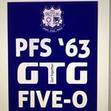Farouk Gulsara's Blog, page 144
June 28, 2017
He who has a why to live will almost any how
The 7 Laws of Magical Thinking: How Irrational Beliefs Keep Us Happy, Healthy and Sane.
Matthew Hutson (Author) 2012
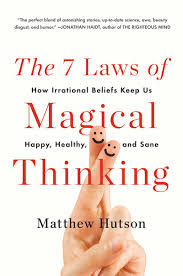 I think one of the things that made Freud and his mentee, Jung go different ways was the belief that things happen for a reason. Sigmund Freud insists that the only real thing is that we are here, on Earth, we live, things happen and we take a bow. Events that happen around us occur at random at its own pace unrelated to our existence. Jung, on the other hand, felt that everything happened for a reason. There may be a cause for an event if we look hard enough. But, are we over analysing and trying to convince ourselves of some fixed ideas that we had concocted to allay our own anxieties?
I think one of the things that made Freud and his mentee, Jung go different ways was the belief that things happen for a reason. Sigmund Freud insists that the only real thing is that we are here, on Earth, we live, things happen and we take a bow. Events that happen around us occur at random at its own pace unrelated to our existence. Jung, on the other hand, felt that everything happened for a reason. There may be a cause for an event if we look hard enough. But, are we over analysing and trying to convince ourselves of some fixed ideas that we had concocted to allay our own anxieties?
Thanks to Kr and SK for sharing this book.
The author of this book is trying to convince us, in his own witty way, that, despite our different levels of religiosity or therein lack of, we are all believers of magic. We place our trusts in objects, events and signs to explain the seemingly occult things that happen around us. We may play a badminton match with a particular racquet, thinking that it is our lucky charm. We may wear lucky bracelets and carry lucky amulets to give us the courage to deal with difficult life-threatening or life-changing decisions.
Magical thinking gives us a sense of control, knowing very well that the environment around us is too complex to comprehend. It gives us meaning to life. It gives a tuft of hope to a person out in the world so cold. It gives purpose to life. In the great words of Nietzsche, 'he who has a why to live will almost any how'.
Modern man rarely likes to take anything at face value. There is an innate desire to analyse and to try to understand everything that is around. This has brought many benefits to mankind but, however, over-analysing has the danger of literally turning himself into a schizophrenic. The strongly held delusions may make him see or hear things which are non-existent, further convincing him of belief and act irrationally.
The book is provocative in that it takes a jibe at superstition and religion. For an atheist, this book carries all the messages that he had been trying to convince others. Anyway, he is not disputing the existence of God. He is merely telling us we use magic to give us sanity and purpose to carry on our lives on Earth.
http://asok22.wix.com/rifle-range-boy
http://.facebook.com/farouk.gulsara
www.riflerangeboy.com
Matthew Hutson (Author) 2012
 I think one of the things that made Freud and his mentee, Jung go different ways was the belief that things happen for a reason. Sigmund Freud insists that the only real thing is that we are here, on Earth, we live, things happen and we take a bow. Events that happen around us occur at random at its own pace unrelated to our existence. Jung, on the other hand, felt that everything happened for a reason. There may be a cause for an event if we look hard enough. But, are we over analysing and trying to convince ourselves of some fixed ideas that we had concocted to allay our own anxieties?
I think one of the things that made Freud and his mentee, Jung go different ways was the belief that things happen for a reason. Sigmund Freud insists that the only real thing is that we are here, on Earth, we live, things happen and we take a bow. Events that happen around us occur at random at its own pace unrelated to our existence. Jung, on the other hand, felt that everything happened for a reason. There may be a cause for an event if we look hard enough. But, are we over analysing and trying to convince ourselves of some fixed ideas that we had concocted to allay our own anxieties?Thanks to Kr and SK for sharing this book.
The author of this book is trying to convince us, in his own witty way, that, despite our different levels of religiosity or therein lack of, we are all believers of magic. We place our trusts in objects, events and signs to explain the seemingly occult things that happen around us. We may play a badminton match with a particular racquet, thinking that it is our lucky charm. We may wear lucky bracelets and carry lucky amulets to give us the courage to deal with difficult life-threatening or life-changing decisions.
Magical thinking gives us a sense of control, knowing very well that the environment around us is too complex to comprehend. It gives us meaning to life. It gives a tuft of hope to a person out in the world so cold. It gives purpose to life. In the great words of Nietzsche, 'he who has a why to live will almost any how'.
Modern man rarely likes to take anything at face value. There is an innate desire to analyse and to try to understand everything that is around. This has brought many benefits to mankind but, however, over-analysing has the danger of literally turning himself into a schizophrenic. The strongly held delusions may make him see or hear things which are non-existent, further convincing him of belief and act irrationally.
The book is provocative in that it takes a jibe at superstition and religion. For an atheist, this book carries all the messages that he had been trying to convince others. Anyway, he is not disputing the existence of God. He is merely telling us we use magic to give us sanity and purpose to carry on our lives on Earth.
http://asok22.wix.com/rifle-range-boy
http://.facebook.com/farouk.gulsara
www.riflerangeboy.com

Published on June 28, 2017 22:20
June 27, 2017
Living on a prayer?
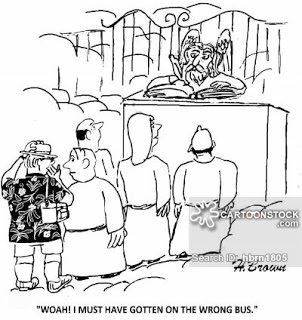
There was an anaesthetic medical officer with whom I had misfortunate to work with always had the, at least I thought so, annoying habit of encouraging the patient that he was going to anaesthetise to engage in a little prayer. He would do so as he was just going to induce sleep. The puzzling thing is that even when a regional anaesthetic failed to induce desired actions, he would ask the patient to brace and say a little prayer!
To a staunch believer, what the good doctor does seem to appear just right; that we are mere mortals, that we should not be too cocky, that everything is indeed not under our control and that we are not infallible. In the other words, we dress the wound, He heals it!
To most people, rationalists and atheists, a call for prayer may sound like a desperate measure and the one that most people resort to when all other humanly endeavours have failed! In other words, a mayday message saying, "only a miracle can save you now!"
In the modern world, in a so-called civilised culture, the name of God is rarely invoked in the day to day conversation. Everybody is expected to perform the job they are entrusted with and to do pass the buck to anybody else, especially God.
At certain times in Japan, spirituality was infused with nationalistic spirit. Failure to uphold patriotic calls would mean immediate self-murder (seppuku).
What transpired in the recent kerfuffle over the pilot's announcement PA system asking the passengers to pray when the plane went into engine problems, is probably a clash of cultures. On the pilot side, it was probably acceptable to mention God's name under his every breath whether it meant it or not. It could be a sort of figure of speech. On the recipient's side, they likely must be telling under their murmurs (and prayers), "No, you jolly well take responsibility of your whatever you have done and don't ask God to bail you out!"http://asok22.wix.com/rifle-range-boy
http://.facebook.com/farouk.gulsara
www.riflerangeboy.com

Published on June 27, 2017 01:00
June 24, 2017
A Tamil whodunnit!
Nadu Iravil (Tamil, In the middle of the night;1965)
Director: S Balachander
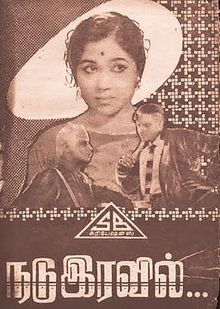 Another obscure film from the annals of the not-so-popular list of old Tamil movies is Nadu Iravil, directed by a multi-talented director, S Balachander who is a talented veena player and also acts in this thriller drama. This flick is based on Agatha Christie's 1939 novel 'And then there were none' (a.k.a Ten Little Niggers).
Another obscure film from the annals of the not-so-popular list of old Tamil movies is Nadu Iravil, directed by a multi-talented director, S Balachander who is a talented veena player and also acts in this thriller drama. This flick is based on Agatha Christie's 1939 novel 'And then there were none' (a.k.a Ten Little Niggers).
Initially shunned by distributors for its unconventional storyline and the dearth of melodious songs which was typical of blockbusters those days, the reels were in cold storage for about five years before Balachander financed and distributed it himself to astounding success!
In the typical whodunnit fashion, the setting of the story is in a big isolated bungalow on a remote island, quite cut-off from civilisation. On the island lived an old couple, Dayanandham and his mentally challenged wife (probably PTSD), Pandari Bai, in recluse, with his comical butler (Cho) and a reliable bald-headed handyman. A doctor (Dr Saravana, S Balachander himself) visits them periodically to give them medical consultations. On one of his visits, Dr Saravana tells Dayanandham that he (Daya) is inflicted with a lethal form of leukaemia. Against Daya's insistence, the good doctor decides to bring in Daya's relatives for a weekend retreat at the island. Apparently, Daya had settled down on the island after an ugly encounter with them. His wife's condition may somehow be related to their behaviour. As Daya's day are numbered, the doctor thought it would be wise to get the whole family together; his brothers, sisters and their dependents.
The whole plan turned to be a disastrous one. It became a shouting match with Daya telling his relatives off that his monies will not go to them despite their admission of past mistakes. On top of that, one by one, people start dying like flies, being murdered in cold blood.
The premise of the movie is track down the killer on the prowl! In midst of all these, the elderly couple finds a gem in the form of their niece, Raagini (Sowkar Janaki).http://asok22.wix.com/rifle-range-boy
http://.facebook.com/farouk.gulsara
www.riflerangeboy.com
Director: S Balachander
 Another obscure film from the annals of the not-so-popular list of old Tamil movies is Nadu Iravil, directed by a multi-talented director, S Balachander who is a talented veena player and also acts in this thriller drama. This flick is based on Agatha Christie's 1939 novel 'And then there were none' (a.k.a Ten Little Niggers).
Another obscure film from the annals of the not-so-popular list of old Tamil movies is Nadu Iravil, directed by a multi-talented director, S Balachander who is a talented veena player and also acts in this thriller drama. This flick is based on Agatha Christie's 1939 novel 'And then there were none' (a.k.a Ten Little Niggers).Initially shunned by distributors for its unconventional storyline and the dearth of melodious songs which was typical of blockbusters those days, the reels were in cold storage for about five years before Balachander financed and distributed it himself to astounding success!
In the typical whodunnit fashion, the setting of the story is in a big isolated bungalow on a remote island, quite cut-off from civilisation. On the island lived an old couple, Dayanandham and his mentally challenged wife (probably PTSD), Pandari Bai, in recluse, with his comical butler (Cho) and a reliable bald-headed handyman. A doctor (Dr Saravana, S Balachander himself) visits them periodically to give them medical consultations. On one of his visits, Dr Saravana tells Dayanandham that he (Daya) is inflicted with a lethal form of leukaemia. Against Daya's insistence, the good doctor decides to bring in Daya's relatives for a weekend retreat at the island. Apparently, Daya had settled down on the island after an ugly encounter with them. His wife's condition may somehow be related to their behaviour. As Daya's day are numbered, the doctor thought it would be wise to get the whole family together; his brothers, sisters and their dependents.
The whole plan turned to be a disastrous one. It became a shouting match with Daya telling his relatives off that his monies will not go to them despite their admission of past mistakes. On top of that, one by one, people start dying like flies, being murdered in cold blood.
The premise of the movie is track down the killer on the prowl! In midst of all these, the elderly couple finds a gem in the form of their niece, Raagini (Sowkar Janaki).http://asok22.wix.com/rifle-range-boy
http://.facebook.com/farouk.gulsara
www.riflerangeboy.com

Published on June 24, 2017 09:30
June 20, 2017
Just to burst your bubble!
The Myth of the Andalusian Paradise
Muslims, Christians and Jews under Islamic Rule in Medieval Spain
Darío Fernández-Morera (2016)
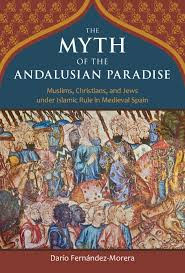 My understanding is that Islam experienced its zenith of growth in Andalusia (Al-Andalus, Islamic Spain). It was the time of the golden age of Islam where everyone lived happily, believers and non-believers alike. I thought Jews and Christians lived in harmony in mutual respect as the 'people of the book'.
My understanding is that Islam experienced its zenith of growth in Andalusia (Al-Andalus, Islamic Spain). It was the time of the golden age of Islam where everyone lived happily, believers and non-believers alike. I thought Jews and Christians lived in harmony in mutual respect as the 'people of the book'.
But, wait! This book by a contemporary historian will burst that bubble. Darío, armed with archaeological evidence from scripts written in Spanish and other European languages, has set a 200-pages bibliography to showcase the extent of his research. He claims to have access to scripts of Christians who fled the tyranny of the marauding Berber horsemen.
He describes our present knowledge of Andalusia akin to learning about America from the life and times of Hollywood actors or about the Arabs from the Saudi royal family. The real situation on the ground comes from the narration of the day to day living of the ordinary subjects living under the Empire, not from scripts written by salaried scribes.
Islamists claim that their religion is one of peace. Their influence beyond their land was via natural expansion, migratory wave, not military expansion. Paradoxically, the author asserts that was not the order of the day. Berbers and mercenaries from Northern Africa were brutal soldiers who went for blood. They had their own code of battle ethics. Following the Maliki school of thoughts, they ensured that men of the conquered land were killed, decapitated and impaled to set as a warning to others. Women and children were enslaved. They had comprehensive rules on keeping sex slaves and the outcome of such union.
Before Southern Spain was conquered, it was under the Visigoth-Catholic-Roman rule. Contrary to popular belief, Europe was not in dark ages but had a semblance of culture. The Roman culture, architecture and way of living had seeped into this area. The Arabs and the Berbers who invaded these areas by of low culture, as described by historian Al Khaldun. These barbarians were happy pulverising buildings to the ground and erecting their places of worship atop pre-existing churches. Their own architectural skills were appalling and their erections were of low quality and would crumble easily.
Just like the present time when the US wants to attack a country, it forms an alliance with a discontented group within a country. To attack Iraq, it cooperates with Saddam's enemies within the country. The Islamic invaders did the same. The Jews, who were unhappy under the Visigoth Christian rule, were treated with disdain for punishing their son of God, Jesus Christ. The Jews were temporarily given special privileges when the Muslims won. Unfortunately, it did not last long. The Muslims remembered a verse in the Quran (5:51) that Jews could never be their allies and would always be their servant! Under the Islamic rule with Maliki form of jurisprudence, they were also ostracised. Many Jews cooperated with the rulers of the day, held high positions in the government and contributed to the day to day running of the province. Some converted to Islam to avoid being humiliated, paying jizya (tax for non-Muslims, dhimmis) while others stayed as closet Jews. Despite all these restrictions, the region experienced the Hebrew Golden Age. Leaders like Maimonides, who played both sides, pleased their political masters whilst holding a tight rein on worship. The erection of synagogues was not allowed and Jews had to wear identification tags.
The Christians to were also treated as second class citizens. Andalus was governed by a system of hierocracy, not democracy, and laws were dictated by a government of clerics. Canon Law and Civil Law which were initiated by the Roman Catholic churches went out of the window. Separation of religion and law was something foreign. They were not allowed to openly display their symbol of worship or to celebrate festivities. During the time of the invasion, many grand churches were converted to mosques.
The drinking well used by them was considered impure for consumption of the Muslims. In the day to day living, the Christians were made to feel unwelcome. Some migrated up to Northern Spain with their scrolls and treasures. Some converted and re-converted to their old religion after the Spanish Inquisition by Queen Isabella.
The author asserts that there was no 'Golden Age' during this era. This area in Spain was cultured by the Visigoth kingdom who looked at the Romans for inspiration. The development happened not because of the Muslim invaders but despite their marauding. If not for their intrusion, he emphasises that they would have reached even greater heights.
There was never a time of co-existence amongst the people of Andalusia. It was always a master and slave relationship. The masters went around with a chip on their shoulders with the conviction that they were chosen to spread Allah's message of peace and brotherhood. It was all Machiavellian politics, not Panglossian. With their twisted Maliki philosophy, they felt justified to wage a holy war once a year, at least.
The grandiosity of Andalus is not of the invaders' doings. They just imported knowledge wholesale and labelled it as theirs. From Persia and the Sassanids came administrative skills. The sciences were translated from Greek to Syriac to Arabic by people already in the kingdom. Mathematics and algorithm originated from India. The so-called Islamic 'universities' were nothing more than madrasahs to learn religion. Researching into science and mathematics was considered unholy. Music and art were discouraged as any representations of living things were deemed as mocking the Almighty. Music and wine were intoxicants that were frowned upon. Poetry, however, was considered harmless. Even women recited poems behind the shield of a curtain and veil.
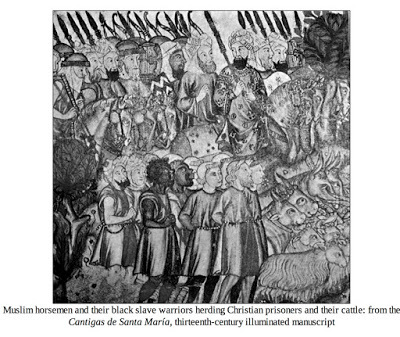 The quite disturbing form of business which was thriving in Al-Andalus was slave trade. As the spoils of their war increased, so did their herd of slaves as the soldiers had a practice of killing all men and sparing children and women. The slaves were sanctioned by the rulers to be used as sex slaves, abused and traded as sex slaves. Offspring from this union became de-facto Muslims and enjoy all rights of a Muslim. The worst of in this society seem to the mohsanas (Muslim wives). They were expected to carry their duties (as for procreation, home duties and caring for the young ones), hence could not be seen in public or be engaged in recreational activities. In that aspect, female slaves had more rights. They could improve themselves by singing and dancing to make themselves more marketable!
The quite disturbing form of business which was thriving in Al-Andalus was slave trade. As the spoils of their war increased, so did their herd of slaves as the soldiers had a practice of killing all men and sparing children and women. The slaves were sanctioned by the rulers to be used as sex slaves, abused and traded as sex slaves. Offspring from this union became de-facto Muslims and enjoy all rights of a Muslim. The worst of in this society seem to the mohsanas (Muslim wives). They were expected to carry their duties (as for procreation, home duties and caring for the young ones), hence could not be seen in public or be engaged in recreational activities. In that aspect, female slaves had more rights. They could improve themselves by singing and dancing to make themselves more marketable!
With such impressive references, it is now the duty of academics to peruse the author's research and challenge his assertions. He posits that the wrongful representation of history was done because of apparent hostility against the Christians. They are accused of being the reason for fall of the Roman Empire. So, to denigrate their prowess, the Muslim conquerors instead were put on a pedestal!
At the present state of world affairs, nothing is going to come out of this single publication. Even if there is any truth in any of these, it is unlikely that those who reminisce the good old glory of Islam where Al-Andalus was a beacon of enlightenment and a place where 'peoples of the Book' allegedly lived in harmony as equals! Cognitive dissonance would come in the way!
http://asok22.wix.com/rifle-range-boy
http://.facebook.com/farouk.gulsara
www.riflerangeboy.com
Muslims, Christians and Jews under Islamic Rule in Medieval Spain
Darío Fernández-Morera (2016)
 My understanding is that Islam experienced its zenith of growth in Andalusia (Al-Andalus, Islamic Spain). It was the time of the golden age of Islam where everyone lived happily, believers and non-believers alike. I thought Jews and Christians lived in harmony in mutual respect as the 'people of the book'.
My understanding is that Islam experienced its zenith of growth in Andalusia (Al-Andalus, Islamic Spain). It was the time of the golden age of Islam where everyone lived happily, believers and non-believers alike. I thought Jews and Christians lived in harmony in mutual respect as the 'people of the book'.But, wait! This book by a contemporary historian will burst that bubble. Darío, armed with archaeological evidence from scripts written in Spanish and other European languages, has set a 200-pages bibliography to showcase the extent of his research. He claims to have access to scripts of Christians who fled the tyranny of the marauding Berber horsemen.
He describes our present knowledge of Andalusia akin to learning about America from the life and times of Hollywood actors or about the Arabs from the Saudi royal family. The real situation on the ground comes from the narration of the day to day living of the ordinary subjects living under the Empire, not from scripts written by salaried scribes.
Islamists claim that their religion is one of peace. Their influence beyond their land was via natural expansion, migratory wave, not military expansion. Paradoxically, the author asserts that was not the order of the day. Berbers and mercenaries from Northern Africa were brutal soldiers who went for blood. They had their own code of battle ethics. Following the Maliki school of thoughts, they ensured that men of the conquered land were killed, decapitated and impaled to set as a warning to others. Women and children were enslaved. They had comprehensive rules on keeping sex slaves and the outcome of such union.
Before Southern Spain was conquered, it was under the Visigoth-Catholic-Roman rule. Contrary to popular belief, Europe was not in dark ages but had a semblance of culture. The Roman culture, architecture and way of living had seeped into this area. The Arabs and the Berbers who invaded these areas by of low culture, as described by historian Al Khaldun. These barbarians were happy pulverising buildings to the ground and erecting their places of worship atop pre-existing churches. Their own architectural skills were appalling and their erections were of low quality and would crumble easily.
Just like the present time when the US wants to attack a country, it forms an alliance with a discontented group within a country. To attack Iraq, it cooperates with Saddam's enemies within the country. The Islamic invaders did the same. The Jews, who were unhappy under the Visigoth Christian rule, were treated with disdain for punishing their son of God, Jesus Christ. The Jews were temporarily given special privileges when the Muslims won. Unfortunately, it did not last long. The Muslims remembered a verse in the Quran (5:51) that Jews could never be their allies and would always be their servant! Under the Islamic rule with Maliki form of jurisprudence, they were also ostracised. Many Jews cooperated with the rulers of the day, held high positions in the government and contributed to the day to day running of the province. Some converted to Islam to avoid being humiliated, paying jizya (tax for non-Muslims, dhimmis) while others stayed as closet Jews. Despite all these restrictions, the region experienced the Hebrew Golden Age. Leaders like Maimonides, who played both sides, pleased their political masters whilst holding a tight rein on worship. The erection of synagogues was not allowed and Jews had to wear identification tags.
The Christians to were also treated as second class citizens. Andalus was governed by a system of hierocracy, not democracy, and laws were dictated by a government of clerics. Canon Law and Civil Law which were initiated by the Roman Catholic churches went out of the window. Separation of religion and law was something foreign. They were not allowed to openly display their symbol of worship or to celebrate festivities. During the time of the invasion, many grand churches were converted to mosques.
The drinking well used by them was considered impure for consumption of the Muslims. In the day to day living, the Christians were made to feel unwelcome. Some migrated up to Northern Spain with their scrolls and treasures. Some converted and re-converted to their old religion after the Spanish Inquisition by Queen Isabella.
The author asserts that there was no 'Golden Age' during this era. This area in Spain was cultured by the Visigoth kingdom who looked at the Romans for inspiration. The development happened not because of the Muslim invaders but despite their marauding. If not for their intrusion, he emphasises that they would have reached even greater heights.
There was never a time of co-existence amongst the people of Andalusia. It was always a master and slave relationship. The masters went around with a chip on their shoulders with the conviction that they were chosen to spread Allah's message of peace and brotherhood. It was all Machiavellian politics, not Panglossian. With their twisted Maliki philosophy, they felt justified to wage a holy war once a year, at least.
The grandiosity of Andalus is not of the invaders' doings. They just imported knowledge wholesale and labelled it as theirs. From Persia and the Sassanids came administrative skills. The sciences were translated from Greek to Syriac to Arabic by people already in the kingdom. Mathematics and algorithm originated from India. The so-called Islamic 'universities' were nothing more than madrasahs to learn religion. Researching into science and mathematics was considered unholy. Music and art were discouraged as any representations of living things were deemed as mocking the Almighty. Music and wine were intoxicants that were frowned upon. Poetry, however, was considered harmless. Even women recited poems behind the shield of a curtain and veil.
 The quite disturbing form of business which was thriving in Al-Andalus was slave trade. As the spoils of their war increased, so did their herd of slaves as the soldiers had a practice of killing all men and sparing children and women. The slaves were sanctioned by the rulers to be used as sex slaves, abused and traded as sex slaves. Offspring from this union became de-facto Muslims and enjoy all rights of a Muslim. The worst of in this society seem to the mohsanas (Muslim wives). They were expected to carry their duties (as for procreation, home duties and caring for the young ones), hence could not be seen in public or be engaged in recreational activities. In that aspect, female slaves had more rights. They could improve themselves by singing and dancing to make themselves more marketable!
The quite disturbing form of business which was thriving in Al-Andalus was slave trade. As the spoils of their war increased, so did their herd of slaves as the soldiers had a practice of killing all men and sparing children and women. The slaves were sanctioned by the rulers to be used as sex slaves, abused and traded as sex slaves. Offspring from this union became de-facto Muslims and enjoy all rights of a Muslim. The worst of in this society seem to the mohsanas (Muslim wives). They were expected to carry their duties (as for procreation, home duties and caring for the young ones), hence could not be seen in public or be engaged in recreational activities. In that aspect, female slaves had more rights. They could improve themselves by singing and dancing to make themselves more marketable!With such impressive references, it is now the duty of academics to peruse the author's research and challenge his assertions. He posits that the wrongful representation of history was done because of apparent hostility against the Christians. They are accused of being the reason for fall of the Roman Empire. So, to denigrate their prowess, the Muslim conquerors instead were put on a pedestal!
At the present state of world affairs, nothing is going to come out of this single publication. Even if there is any truth in any of these, it is unlikely that those who reminisce the good old glory of Islam where Al-Andalus was a beacon of enlightenment and a place where 'peoples of the Book' allegedly lived in harmony as equals! Cognitive dissonance would come in the way!
http://asok22.wix.com/rifle-range-boy
http://.facebook.com/farouk.gulsara
www.riflerangeboy.com

Published on June 20, 2017 09:30
June 18, 2017
Humanity, the only true relation between human beings!
Sujata (1959)
Director: Bimal Roy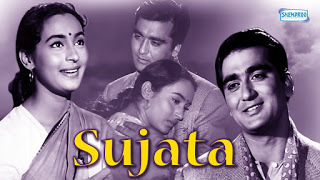
It is said that aptitudes of human being draw them into certain professions. Individuals with scholarly abilities dealt with the law and sciences; those with fine physical attributes would be assigned to guard the state; merchants will be from those good with dealing with money, and some may be good with acts that are repetitive in nature.
Over time, as specialisation set in, when people who had learnt every nook and cranny bit of the trade were an asset. Slowly the system divided people by birth to professions as apprenticeship started early in life. Thus started the caste system, otherwise, a social class system that is no different than in any other society.
This movie shows the ugly side of segregation of people by birth. By virtue of their birth, they are deprived many things which are considered basic necessities in life- education, a social support when their family is displaced and the dignity that every living being is entitled to.
Sujata is born to the Chandala caste of the untouchables. She is orphaned at birth as both her parents succumbed to cholera. The workers, unable to find a home for this newborn, dump her at the chief engineer's house. Yo-yoing between getting a new home and not, Sujata grows to adulthood under the care of the maid in the engineer's Brahmin household with his daughter, Rama. Deprived of education and parental love, Sujata treats her foster parents as her own parents but it is a one-sided affair. A religious aunt, the friend of the family, makes sure that she is reminded of her birth. Under the aunt's care is her orphan grandson, Adhir. When the children grow older, the parents try to matchmake Rama and Adhir but Adhir has both eyes transfixed on Sujata. Therein starts the drama. Sujata tries to do the right thing, to sacrifice her inner desires to pay back her foster parents' care and Adhir has to decide between keeping the religion-centric grandmother satisfied and rejecting his love based on caste!
A sombre movie with a suave hero in Sunil Dutt and demure actress in Nutan give a sober performance without too much of melodrama. It was nominated to the Cannes film festival.
Humanity is the only true relation between human beings!
Do not ever think that the class clash is all over! It is very much alive today as it was the 1950s. Some say that the beef ban is a form of collision of the the castes, the non-meat eating members of the upper caste exerting their superiority over the supposedly beef-eating 'lesser' Hindus, tribal people, Dalits and non-Hindus!http://asok22.wix.com/rifle-range-boy
http://.facebook.com/farouk.gulsara
www.riflerangeboy.com
Director: Bimal Roy

It is said that aptitudes of human being draw them into certain professions. Individuals with scholarly abilities dealt with the law and sciences; those with fine physical attributes would be assigned to guard the state; merchants will be from those good with dealing with money, and some may be good with acts that are repetitive in nature.
Over time, as specialisation set in, when people who had learnt every nook and cranny bit of the trade were an asset. Slowly the system divided people by birth to professions as apprenticeship started early in life. Thus started the caste system, otherwise, a social class system that is no different than in any other society.
This movie shows the ugly side of segregation of people by birth. By virtue of their birth, they are deprived many things which are considered basic necessities in life- education, a social support when their family is displaced and the dignity that every living being is entitled to.
Sujata is born to the Chandala caste of the untouchables. She is orphaned at birth as both her parents succumbed to cholera. The workers, unable to find a home for this newborn, dump her at the chief engineer's house. Yo-yoing between getting a new home and not, Sujata grows to adulthood under the care of the maid in the engineer's Brahmin household with his daughter, Rama. Deprived of education and parental love, Sujata treats her foster parents as her own parents but it is a one-sided affair. A religious aunt, the friend of the family, makes sure that she is reminded of her birth. Under the aunt's care is her orphan grandson, Adhir. When the children grow older, the parents try to matchmake Rama and Adhir but Adhir has both eyes transfixed on Sujata. Therein starts the drama. Sujata tries to do the right thing, to sacrifice her inner desires to pay back her foster parents' care and Adhir has to decide between keeping the religion-centric grandmother satisfied and rejecting his love based on caste!
A sombre movie with a suave hero in Sunil Dutt and demure actress in Nutan give a sober performance without too much of melodrama. It was nominated to the Cannes film festival.
Humanity is the only true relation between human beings!
Do not ever think that the class clash is all over! It is very much alive today as it was the 1950s. Some say that the beef ban is a form of collision of the the castes, the non-meat eating members of the upper caste exerting their superiority over the supposedly beef-eating 'lesser' Hindus, tribal people, Dalits and non-Hindus!http://asok22.wix.com/rifle-range-boy
http://.facebook.com/farouk.gulsara
www.riflerangeboy.com

Published on June 18, 2017 09:30
June 16, 2017
What were they thinking?
The whole nation has been hit by a spate of bullying, of late.Youngsters, without batting an eyelid, have no remorse to resorting to violence to assert their authority over the others whom they perceive as weak, disadvantaged or just different. perhaps, they are just apeing their role models, their parents or even leaders.
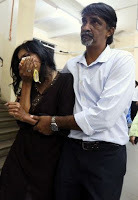 In the latest incident, the nation is reeling from the death of a 19 old boy who never gained consciousness after being hit on and sodomised for being effeminate. Although the information is patchy, the gist of the string of events is that a quarrel ensued over a heckling which progressed to a lopsided fistfight and bashing of the victim and his friend by four other teenagers.
In the latest incident, the nation is reeling from the death of a 19 old boy who never gained consciousness after being hit on and sodomised for being effeminate. Although the information is patchy, the gist of the string of events is that a quarrel ensued over a heckling which progressed to a lopsided fistfight and bashing of the victim and his friend by four other teenagers.
Looking at the faces of the helpless relatives, one can just wonder at the meaning of this violence. Forget the fact that we should all live within our boundaries, live and let live.There are people that who are different from us for us to learn and appreciate but not to change them to follow our path.
Imagine what would have gone through the minds of the perpetrators as they pounced and punched with the anger so intense to make a pulp out the boy, all because he was not 'man' enough! The pictures of the accused which had been circulating in the social media just show faces of regular guys whom you would not give a second look of suspicion if you had seen them on the street. Telltale signs of scarred face and triad tattoos are conspicuously missing.
 It is not that their minds are so juvenile or primordial that they are unable to differentiate what is right, virtuous and hurtful. Is there a competition for territory, mate or food? Just perception of what is right and should be accepted as the norm! This, fueled by the pleasure of power and control in a mob-like situation in the company of the herd, the reptilian brain took charge. Here we see an interesting interplay between the pre-frontal cortex which is the new kid on the block which processes thoughts with emotion and the lurking primitive feelings of the archaic reptilian brain.
It is not that their minds are so juvenile or primordial that they are unable to differentiate what is right, virtuous and hurtful. Is there a competition for territory, mate or food? Just perception of what is right and should be accepted as the norm! This, fueled by the pleasure of power and control in a mob-like situation in the company of the herd, the reptilian brain took charge. Here we see an interesting interplay between the pre-frontal cortex which is the new kid on the block which processes thoughts with emotion and the lurking primitive feelings of the archaic reptilian brain.
This whole scenario reminds of the case of Leopold and Loeb in the US Courts in 1924 in which two highly intelligent young men decide to do the perfect murder, just for the heck of it, because they could. The trial was dubbed the trial of the century and for the first time brought in experts in the field of forensic psychiatry. They were incarcerated with life imprisonment.
If there is any way of destroying hatred and all that goes with it, it's not through evil and hatred and cruelty, but through charity, love, understanding. (dialogue from 1959 Hollywood blockbuster 'Compulsion' .)
http://famous-trials.com/leopoldandloeb
Welles delivers a stirring plea for the lives of Leopold and Loeb in the climax of the 1959 film Compulsion. The final summation is taken directly from the transcript of the real trial. As good an oration against the death penalty as you'll ever hear.http://asok22.wix.com/rifle-range-boy
http://.facebook.com/farouk.gulsara
www.riflerangeboy.com
 In the latest incident, the nation is reeling from the death of a 19 old boy who never gained consciousness after being hit on and sodomised for being effeminate. Although the information is patchy, the gist of the string of events is that a quarrel ensued over a heckling which progressed to a lopsided fistfight and bashing of the victim and his friend by four other teenagers.
In the latest incident, the nation is reeling from the death of a 19 old boy who never gained consciousness after being hit on and sodomised for being effeminate. Although the information is patchy, the gist of the string of events is that a quarrel ensued over a heckling which progressed to a lopsided fistfight and bashing of the victim and his friend by four other teenagers.Looking at the faces of the helpless relatives, one can just wonder at the meaning of this violence. Forget the fact that we should all live within our boundaries, live and let live.There are people that who are different from us for us to learn and appreciate but not to change them to follow our path.
Imagine what would have gone through the minds of the perpetrators as they pounced and punched with the anger so intense to make a pulp out the boy, all because he was not 'man' enough! The pictures of the accused which had been circulating in the social media just show faces of regular guys whom you would not give a second look of suspicion if you had seen them on the street. Telltale signs of scarred face and triad tattoos are conspicuously missing.
 It is not that their minds are so juvenile or primordial that they are unable to differentiate what is right, virtuous and hurtful. Is there a competition for territory, mate or food? Just perception of what is right and should be accepted as the norm! This, fueled by the pleasure of power and control in a mob-like situation in the company of the herd, the reptilian brain took charge. Here we see an interesting interplay between the pre-frontal cortex which is the new kid on the block which processes thoughts with emotion and the lurking primitive feelings of the archaic reptilian brain.
It is not that their minds are so juvenile or primordial that they are unable to differentiate what is right, virtuous and hurtful. Is there a competition for territory, mate or food? Just perception of what is right and should be accepted as the norm! This, fueled by the pleasure of power and control in a mob-like situation in the company of the herd, the reptilian brain took charge. Here we see an interesting interplay between the pre-frontal cortex which is the new kid on the block which processes thoughts with emotion and the lurking primitive feelings of the archaic reptilian brain.This whole scenario reminds of the case of Leopold and Loeb in the US Courts in 1924 in which two highly intelligent young men decide to do the perfect murder, just for the heck of it, because they could. The trial was dubbed the trial of the century and for the first time brought in experts in the field of forensic psychiatry. They were incarcerated with life imprisonment.
If there is any way of destroying hatred and all that goes with it, it's not through evil and hatred and cruelty, but through charity, love, understanding. (dialogue from 1959 Hollywood blockbuster 'Compulsion' .)
http://famous-trials.com/leopoldandloeb
Welles delivers a stirring plea for the lives of Leopold and Loeb in the climax of the 1959 film Compulsion. The final summation is taken directly from the transcript of the real trial. As good an oration against the death penalty as you'll ever hear.http://asok22.wix.com/rifle-range-boy
http://.facebook.com/farouk.gulsara
www.riflerangeboy.com

Published on June 16, 2017 09:20
June 15, 2017
One Woman One Man?
Bandini (The Female Prisoner, Hindi; 1963)
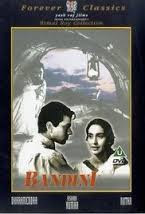 This must surely be one of the early female-centric Hindi movies with Nutan taking the leading role. It is a subtle movie without the overt melodrama usually associated with Bollywood films. The black and white print set the tone for sombre nature of the subject the story is trying to tell.
This must surely be one of the early female-centric Hindi movies with Nutan taking the leading role. It is a subtle movie without the overt melodrama usually associated with Bollywood films. The black and white print set the tone for sombre nature of the subject the story is trying to tell.
Set in the 1930s Bengal, at the height of Independence movement, Kalyani (Nutan), a poem loving lass with a sad life in her past, losing her brother and mother, falls in love with a freedom fighter, Bikash. He promises to return to marry her but never does. Unable to tolerate the vicious bad mouthing of the villagers, she leaves home.
She eventually works a nurse to care for a very demanding mentally disturbed patient who happens to be Bikash's wife. In the fit of rage, Kalyani poisons her and is imprisoned.
It is at the prison that the movie actually starts and the rest are told in flashbacks. The prison doctor (Dharmendra) falls in love with her. Kalyani's dilemma here is two-fold. First, in the prison, it is whether a tainted person like her is good enough a match for an honourable doctor. Next, when she realises that Bikash was put in a spot to marry his wife and that he is indeed quite sick, she has to make a decision whether to start a new life for herself or to sacrifice it to serve the one she had hopelessly surrendered her heart and soul.
At the end of the day, (spoiler alert), the dictum, one man to one woman till death do them apart, prevail. It could have been a feminist or women-empowerment movie but to keep with the sensitivities of the time and to preserve what is expected of an Indian wife, she pushes aside her desires to be the self-sacrificing subservient that the member of the fairer sex is expected to do!
The question now is whether the adage, one man to one woman, still holds true even if the other party does not hold to the promise. In this self-centred society, is it alright to put aside all empathy and duties as one holds the duty to take care of himself before surrendering his whole life to some else just because at one time in their life, a promise was made? Unlike the thinking in the modern living, traditional matrimonial bonds are made in the witness of the elements of Nature and are held in the premise that only Nature can make or break these nuptial bonds!http://asok22.wix.com/rifle-range-boy
http://.facebook.com/farouk.gulsara
www.riflerangeboy.com
 This must surely be one of the early female-centric Hindi movies with Nutan taking the leading role. It is a subtle movie without the overt melodrama usually associated with Bollywood films. The black and white print set the tone for sombre nature of the subject the story is trying to tell.
This must surely be one of the early female-centric Hindi movies with Nutan taking the leading role. It is a subtle movie without the overt melodrama usually associated with Bollywood films. The black and white print set the tone for sombre nature of the subject the story is trying to tell.Set in the 1930s Bengal, at the height of Independence movement, Kalyani (Nutan), a poem loving lass with a sad life in her past, losing her brother and mother, falls in love with a freedom fighter, Bikash. He promises to return to marry her but never does. Unable to tolerate the vicious bad mouthing of the villagers, she leaves home.
She eventually works a nurse to care for a very demanding mentally disturbed patient who happens to be Bikash's wife. In the fit of rage, Kalyani poisons her and is imprisoned.
It is at the prison that the movie actually starts and the rest are told in flashbacks. The prison doctor (Dharmendra) falls in love with her. Kalyani's dilemma here is two-fold. First, in the prison, it is whether a tainted person like her is good enough a match for an honourable doctor. Next, when she realises that Bikash was put in a spot to marry his wife and that he is indeed quite sick, she has to make a decision whether to start a new life for herself or to sacrifice it to serve the one she had hopelessly surrendered her heart and soul.
At the end of the day, (spoiler alert), the dictum, one man to one woman till death do them apart, prevail. It could have been a feminist or women-empowerment movie but to keep with the sensitivities of the time and to preserve what is expected of an Indian wife, she pushes aside her desires to be the self-sacrificing subservient that the member of the fairer sex is expected to do!
The question now is whether the adage, one man to one woman, still holds true even if the other party does not hold to the promise. In this self-centred society, is it alright to put aside all empathy and duties as one holds the duty to take care of himself before surrendering his whole life to some else just because at one time in their life, a promise was made? Unlike the thinking in the modern living, traditional matrimonial bonds are made in the witness of the elements of Nature and are held in the premise that only Nature can make or break these nuptial bonds!http://asok22.wix.com/rifle-range-boy
http://.facebook.com/farouk.gulsara
www.riflerangeboy.com

Published on June 15, 2017 09:01
June 13, 2017
Wrong decisions based on wrong compositions?
 A NASA telescope called NuSTAR for short,which is roaming around approximately 324 million light-years from Earth, happened to be in perfect position to see a black hole's powerful gravitytugging on X-ray light emitted from a nearby Corona.The discourse started over an article about a poor Hindu man who tried to advise a Muslim man against urinating in the open in a public space. The ego-dented Muslim called his friends to give the Hindu a nice bashing that he would never forget. Well, he never had the chance to remember. He was beaten up in the plain view of the public who, sadly, not one person came to his help or did call the police. The poor man succumbed to his injuries.
A NASA telescope called NuSTAR for short,which is roaming around approximately 324 million light-years from Earth, happened to be in perfect position to see a black hole's powerful gravitytugging on X-ray light emitted from a nearby Corona.The discourse started over an article about a poor Hindu man who tried to advise a Muslim man against urinating in the open in a public space. The ego-dented Muslim called his friends to give the Hindu a nice bashing that he would never forget. Well, he never had the chance to remember. He was beaten up in the plain view of the public who, sadly, not one person came to his help or did call the police. The poor man succumbed to his injuries.The incident escalated to a racial clash when the real issue is public apathy and the curse of being born poor.
From that angle, the debate went on to whether being poor is one's own fault or it is due to a composite of factors. My friend insists that it is self-made. Everybody is given equal opportunities in life. People make wrong decisions again and again and the end result is being stuck in the lowest rung of the society. In this wide world, chances are there for our taking. Nothing happens by chance. We are who we are due to decisions that we made in life.
That is where I differed in my opinion. No doubt decisions are ours to make, not everybody is endowed with the wisdom, willpower and intelligence to choose what is indeed best for him in the long run. Some do not have the foresight beyond that of a goldfish. Others are weak to persevere the hardship and throw in the towel easily. The tenacity to withstand a pressure cooker is sum product of his genetic makeup and environmental factors. Poverty is a rut that traps one in a vicious cycle of malady, hopelessness and melancholia. Lack of parental guidance and supervision, lack of opportunities, lack of role models, lack of push factors and intrinsic desire for instant gratifications just perpetuates one to stay in the status quo. Poverty itself cuts down options. The need to bring the bacon draws both parents on a back breaking money earning spree at the expense of familial bonding and parental supervision. Economic deprivation draws them to less affluent neighbourhoods with less equipped educational facilities. Destitution reduces confidence. A large family demands sacrifices from all its members. In the name of compassion and blood bonding, the skin quivers and siblings have to give up privileges. Then there are social diseases and the list goes on.
Realisation to break-free usually comes in the form of inner realisation, a kind of Enlightenment from within one's self with a little help from good friends with the same wavelength and family guidance.
Is there a guardian angel who paves the correct path for you or your astronomical coordinates that determine your lifeline?
http://asok22.wix.com/rifle-range-boy
http://.facebook.com/farouk.gulsara
www.riflerangeboy.com

Published on June 13, 2017 09:06
June 11, 2017
All dolled up for what?
Bommai (Doll, Tamil; 1964)
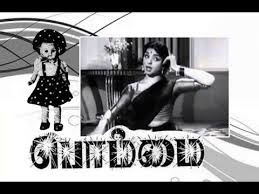
Came across this not so famous movie director S Balachandar, but a with a famous song which used to be a regular feature over the airwaves in our childhood - 'Thatti thatti Nadanthu Varum Chella Paapa' was immensely popular.
It is one of those rare suspense thriller films made in the Tamil cinema. It is supposed to be modelled after Alfred Hitchcock's 1936 Sabotage. It is a story of confusion when a bomb-laden doll meant to kill an entrepreneur is misplaced and fail to reach the intended recipient. By a twist of fate, the doll gets going around from hand to hand. The protagonist of the film, the loyal office worker, goes on a wild goose chase trying to locate the doll and avert catastrophe.
In spite of using mainly unknown actors, the film was a hit at the box office and passed the psychological mark 100-days' screening which marks the acceptance of the movie by the public. The only familiar faces in the cast are the captivating L. Vijayalakshmi who later was regularly paired with Jayshankar in his espionage movies and V.S. Raghavan who is cast as a villain. A very young V. Gopalakrishnan, a long time supporting actor is another recognisable face. K.J. Yesudas sings one of the songs and is seen in the credits (see below), in person, in his less hirsute form. The actors and the rest of the crew are introduced at the end by the director in an unusual format.
In keeping with the theme that it is, after all, a Tamil movie, the director managed to squeeze in a little bit of philosophy through K.J. Yesudas' song, 'Neeyum Bommai, Naanum Bommai' (see third youtube snippet below). The subtle message imbibed in the song, which is sung by a beggar, laments that we are all lifeless dolls in the society. Children are helpless dolls needing the care of their mothers. The poor people are dependent on the rich. In the temple, the spineless are bowing to a lifeless God. In front of the strong and powerful, the good-hearted crumble. To the rich, the poor are their puppets. Workers are puppets on a string controlled by their masters. We are helpless in the wave of fate and karma where we are all taken for a spin. And we all become slaves to love and passion. Wow, there can be so much from a story of a doll with a ticking bomb!
http://asok22.wix.com/rifle-range-boy
http://.facebook.com/farouk.gulsara
www.riflerangeboy.com

Came across this not so famous movie director S Balachandar, but a with a famous song which used to be a regular feature over the airwaves in our childhood - 'Thatti thatti Nadanthu Varum Chella Paapa' was immensely popular.
It is one of those rare suspense thriller films made in the Tamil cinema. It is supposed to be modelled after Alfred Hitchcock's 1936 Sabotage. It is a story of confusion when a bomb-laden doll meant to kill an entrepreneur is misplaced and fail to reach the intended recipient. By a twist of fate, the doll gets going around from hand to hand. The protagonist of the film, the loyal office worker, goes on a wild goose chase trying to locate the doll and avert catastrophe.
In spite of using mainly unknown actors, the film was a hit at the box office and passed the psychological mark 100-days' screening which marks the acceptance of the movie by the public. The only familiar faces in the cast are the captivating L. Vijayalakshmi who later was regularly paired with Jayshankar in his espionage movies and V.S. Raghavan who is cast as a villain. A very young V. Gopalakrishnan, a long time supporting actor is another recognisable face. K.J. Yesudas sings one of the songs and is seen in the credits (see below), in person, in his less hirsute form. The actors and the rest of the crew are introduced at the end by the director in an unusual format.
In keeping with the theme that it is, after all, a Tamil movie, the director managed to squeeze in a little bit of philosophy through K.J. Yesudas' song, 'Neeyum Bommai, Naanum Bommai' (see third youtube snippet below). The subtle message imbibed in the song, which is sung by a beggar, laments that we are all lifeless dolls in the society. Children are helpless dolls needing the care of their mothers. The poor people are dependent on the rich. In the temple, the spineless are bowing to a lifeless God. In front of the strong and powerful, the good-hearted crumble. To the rich, the poor are their puppets. Workers are puppets on a string controlled by their masters. We are helpless in the wave of fate and karma where we are all taken for a spin. And we all become slaves to love and passion. Wow, there can be so much from a story of a doll with a ticking bomb!
http://asok22.wix.com/rifle-range-boy
http://.facebook.com/farouk.gulsara
www.riflerangeboy.com

Published on June 11, 2017 20:52
June 9, 2017
The lure, too strong, you crumble!
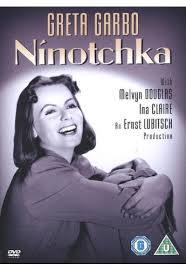 Ninotchka (1939)
Ninotchka (1939)
At one look, it appears like a movie from the genre of, what we would call 'romcom' (romantic comedy). Look deeper, it is a parody of communism and poking fun at the lifestyle of Bolsheviks who oust their bourgeois to distribute the wealth of the nation to the working class people. Look deeper still, you will find the unanswerable question of life. Is the purpose of life is to enjoy the moment, here and now or is it a journey of self-discovery, self-discipline, following of a preset path for a mission to be attained at the end of it all?
This preWW2 film was banned in the Soviet Union and its controlled countries as it painted a lifeless, caricatured and an automaton-like picture of Soviet people and its officers. In the film, life in Russia is portrayed as pathetic. Living in cramped quarters with privacy being an alien word and eating omelette is a luxurious cuisine.
It is the post-Bolshevik Russia and three Soviet officers are sent to Paris to auction off a set of jewellery from the aristocratic collections to finance the Stalin's 5-year plan programme. (There is a joke in the movie about the 5-year-plan taking 15 years to complete!)
The three bumbling officers, drawn to city lights and the lure of Paris orchestrated by exiled Russian bourgeoisie, go astray from their duties. Soviet authorities send their straight talking business minded special officer Ninotchka Yakushova to put things straight. Things were going right for the Russians until Ninotchka fell in love with the lure of private ownership, commercialism, the luxury of life in the free world and a hopelessly romantic playboy and a Count.
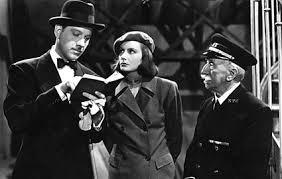 At the end of the day, personal ambitions, drive to do the good thing for the greater God and to do the right thing all took a backseat. The inner primordial desire to satisfy lust, to enjoy the finer things in life, sloth and greed won. No matter how hard one tries to attain his ambitions, Man, being Man, crumbles to his indwelling biological needs. You can only suppress the feelings to a certain extent. He would ponder on the futility of this exercise when the environment he is in is not hostile. He would question the necessity to prepare for an uncertain catastrophe, which in his current situation would appear remote or even non-existent. That is when he would the shields down and tell himself that he had a fool all these while. But has he?
At the end of the day, personal ambitions, drive to do the good thing for the greater God and to do the right thing all took a backseat. The inner primordial desire to satisfy lust, to enjoy the finer things in life, sloth and greed won. No matter how hard one tries to attain his ambitions, Man, being Man, crumbles to his indwelling biological needs. You can only suppress the feelings to a certain extent. He would ponder on the futility of this exercise when the environment he is in is not hostile. He would question the necessity to prepare for an uncertain catastrophe, which in his current situation would appear remote or even non-existent. That is when he would the shields down and tell himself that he had a fool all these while. But has he?Memorable lines
This picture takes place in Paris in those wonderful days when a siren was a brunette and not an alarm --- and if a Frenchman turned out the light, it was not on account of an air raid! (Introduction)
"I was hurt when the swallows left us in the winter for capitalistic countries. N ow I know why! We have the high ideals, they have the climate!" 'says Nintschka when she opens a Parisian hotel window to appreciate the capitalistc air!http://asok22.wix.com/rifle-range-boy
http://.facebook.com/farouk.gulsara
www.riflerangeboy.com

Published on June 09, 2017 09:07

